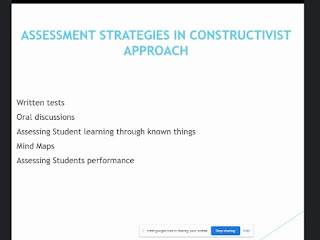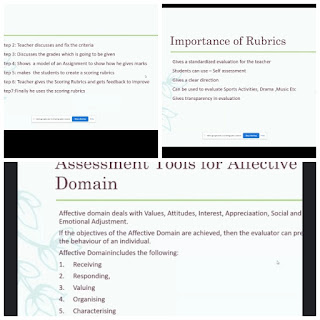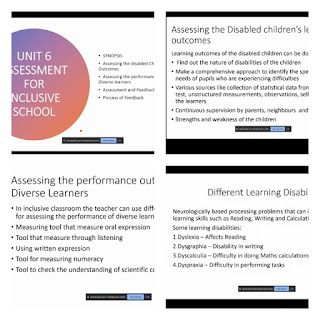Unit 1 Assessment in learning
INTRODUCTION
The term Assessment has been widely used by educators to evaluate, measure, and
document the academic readiness, learning progress, and skill acquisition of students throughout
their learning in life. Different terminologies are there for assessment and evaluation such as
Measurement, Tests, Examination, Appraisal and Evaluation. There are certain Learning theories
which are having conceptual frameworks describing how information is absorbed, processed and
retained during learning.
Meaning of Assessment
In education, the term assessment refers to the wide variety of methods that educators use
to evaluate, measure, and document the academic readiness, learning progress, and skill
acquisition of students from preschool through college and adulthood. It is the process of
systematically gathering information as part of an evaluation.
Meaning of Evaluation
Evaluation is a broader term that refers to all of the methods used to find out what
happens as a result of using a specific intervention or practice. Evaluation is the systematic
assessment of the worth or merit of some object. It is the systematic acquisition and assessment
of information to provide useful feedback about some object.
PRINCIPLES OF ASSESSMENT
a. Reliability
A test can be reliable but not valid, whereas a test cannot be valid yet
unreliable. Reliability, in simple terms, describes the repeatability and consistency of a test.
Validity defines the strength of the final results and whether they can be regarded as accurately
describing the real world.
b. Validity
The word "valid" is derived from the Latin validus, meaning strong. The validity of a
measurement tool (for example, a test in education) is considered to be the degree to which the
tool measures what it claims to measure; in this case, the validity is an equivalent to accuracy.
c. Relevance and transferability
In education, the term relevance typically refers to learning experiences that are either
directly applicable to the personal aspirations, interests or cultural experiences of students
(personal relevance) or that are connected in some way to real-world issues, problems and
contexts (life relevance).
Relevance is the concept of one topic being connected to another topic in a way that
makes it useful to consider the first topic when considering the second. The concept of relevance
is studied in many different fields, including cognitive sciences, logic, and library and
information science.
ROLE OF ASSESSMENT IN LEARNING
Assessment plays a major role in how students learn, their motivation to learn, and how
teachers teach.
Assessment is used for various purposes.
Assessment for learning: where assessment helps teachers gain insight into what students
understand in order to plan and guide instruction, and provide helpful feedback to students.
Assessment as learning: where students develop an awareness of how they learn and use that
awareness to adjust and advance their learning, taking an increased responsibility for their learning.
Assessment of learning: where assessment informs students, teachers and parents, as well as the
broader educational community, of achievement at a certain point in time in order to celebrate
success, plan interventions and support continued progress.
Assessment must be planned with its purpose in mind. Assessment for, as and of learning all
have a role to play in supporting and improving student learning, and must be appropriately
balanced. The most important part of assessment is the interpretation and use of the information that
is gleaned for its intended purpose.
Assessment is embedded in the learning process. It is tightly interconnected with curriculum and
instruction. As teachers and students work towards the achievement of curriculum outcomes,
FORMATIVE AND SUMMATIVE ASSESSMENT
Formative assessments are commonly said to be for learning because educators use the
results to modify and improve teaching techniques during an instructional period, while summative
assessments are said to be of learning because they evaluate academic achievement at the conclusion
of an instructional period. Or as assessment expert Paul Black put it, “When the cook tastes the soup,
that’s formative assessment, when the customer tastes the soup, that’s summative assessment.”
REPORTING OF ASSESSMENT FINDINGS
Assessment is an ongoing and integral part of the teaching and learning process. Through this
process schools are able to provide easy-to-understand reports to parents about individual student
learning outcomes.
The type of assessment and report varies at different times during a student's school life. Formal
reporting to parents will occur at least once every semester. Parents are encouraged to discuss their
children's progress and needs with teachers at any time.
Unit-2 -Assessment for learning in classroom
Unit 3-Tools and Techniques for a class room Assessment






























No comments:
Post a Comment